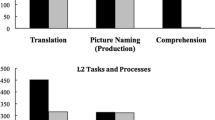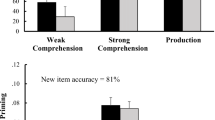Abstract
The effect of speaker variability on accessing the form and meaning of spoken words was evaluated in two short-term priming experiments. In the repetition priming experiment, participants listened to repeated or unrelated prime-target pairs, in which the prime and target were produced by the same speaker or different speakers. The results showed robust repetition priming, but only partial evidence of reduction of priming by speaker variability. In the semantic/associative priming experiment, participants listened to semantically/associatively related or unrelated prime-target pairs, in which the prime and target were produced by the same speaker or different speakers. The results showed robust semantic/associative priming, but the reduction of priming by speaker variability took place only for targets produced by the female speaker. There is no evidence that the speaker variability effect varied as a function of inter-stimulus interval. These findings suggest that speaker variability could affect access to word form and meaning, but the impact is relatively weak.


Similar content being viewed by others
References
Abercrombie, D. (1967). Elements of general phonetics. Chicago: Aldine.
Andruski, J. E., Blumstein, S. E., & Burton, M. (1994). The effects of subphonetic differences on lexical access. Cognition, 52, 163–187.
Church, B. A., & Schacter, D. L. (1994). Perceptual specificity of auditory priming: Implicit memory for voice intonation and fundamental frequency. Journal of Experimental Psychology: Learning, Memory, and Cognition, 20, 521–533.
Creel, S. C., Aslin, R. N., & Tanenhaus, M. K. (2008). Heeding the voice of experience: The role of talker variation in lexical access. Cognition, 106, 633–664.
Forster, K. I., & Davis, C. (1984). Repetition priming and frequency attenuation in lexical access. Journal of Experimental Psychology: Learning, Memory, and Cognition, 10, 680–698.
Goldinger, S. D. (1996). Words and voices: Episodic traces in spoken word identification and recognition memory. Journal of Experimental Psychology: Learning, Memory, and Cognition, 22, 1166–1183.
Jackson, A., & Morton, J. (1984). Facilitation of auditory recognition. Memory & Cognition, 12, 568–574.
Johnson, K., & Mullennix, J. W. (1997). Complex representations used in speech processing: Overview of the book. In K. Johnson & J. W. Mullennix (Eds.), Talker variability in speech processing (pp. 1–8). San Diego, CA: Academic Press.
Kittredge, A., Davis, L., & Blumstein, S. E. (2006). Effects of nonlinguistic auditory variations on lexical processing in Broca’s aphasics. Brain and Language, 97, 25–40.
Luce, P. A., & Lyons, E. A. (1998). Specificity of memory representations for spoken words. Memory & Cognition, 26, 708–715.
Luce, P. A., McLennan, C. T., & Charles-Luce, J. (2003). Abstractness and specificity in spoken word recognition: Indexical and allophonic variability in long-term repetition priming. In J. Bowers & C. Marsolek (Eds.), Rethinking implicit memory (pp. 197–214). England: Oxford University Press.
Luce, P. A., & McLennan, C. T. (2005). Spoken word recognition: The challenge of variation. In D. B. Pisoni & R. E. Remez (Eds.), The handbook of speech perception (pp. 591–609). Malden, MA: Blackwell Publishing.
Massaro, D. W. (1970). Preperceptual auditory images. Journal of Experimental Psychology, 85, 411–417.
Mattys, S. L., & Liss, J. M. (2008). On building models of spoken-word recognition: When there is as much to learn from natural “oddities” as artificial normality. Perception & Psychophysics, 70, 1235–1242.
McLennan, C. T., Luce, P. A., & Charles-Luce, J. (2003). Representation of lexical form. Journal of Experimental Psychology: Learning, Memory, and Cognition, 29, 539–553.
McLennan, C. T., & Luce, P. A. (2005). Examining the time course of indexical specificity effects in spoken word recognition. Journal of Experimental Psychology: Learning, Memory, and Cognition, 31, 306–321.
Mertus, J. A. (2000). The Brown Lab Interactive Speech System [Computer software]. Providence, RI: Brown University. Retrieved from http://mertus.org/Bliss/.
Meyer, D. E., & Schvaneveldt, R. W. (1976). Meaning, memory structure, and mental processes. Science, 192, 27–33.
Nygaard, L. C., Sommers, M. S., & Pisoni, D. B. (1994). Speech perception as a talker-contingent process. Psychological Science, 5, 42–46.
Palmeri, T. J., Goldinger, S. D., & Pisoni, D. B. (1993). Episodic encoding of voice attributes and recognition memory for spoken words. Journal of Experimental Psychology: Learning, Memory, and Cognition, 19, 309–328.
Pisoni, D. B. (1997). Some thoughts on “normalization” in speech perception. In K. Johnson & J. W. Mullennix (Eds.), Talker variability in speech processing (pp. 9–32). San Diego, CA: Academic Press.
Schacter, D. L., & Church, B. A. (1992). Auditory priming: Implicit and explicit memory for words and voices. Journal of Experimental Psychology: Learning, Memory, and Cognition, 18, 915–930.
Studebaker, G. A. (1985). A “rationalized” arcsine transformation. Journal of Speech and Hearing Research, 28, 455–462.
Sumner, M., & Samuel, A. G. (2009). The role of experience in the processing of cross-dialectal variation. Journal of Memory and Language, 60, 487–501.
Vitevitch, M. S., & Donoso, A. (2011). Processing indexical information requires time: Evidence from change deafness. The Quarterly Journal of Experimental Psychology, 64, 1484–1493.
Wilson, R. H., & Carhart, R. (1971). Forward and backward masking: Interactions and addivity. Journal of the Acoustical Society of America, 49, 1254–1263.
Author information
Authors and Affiliations
Corresponding author
Additional information
We thank Danny R. Moates for assistance in recruiting participants, Lauren Baer and Eleni Gkikas for assistance in administering the experiments, and Juliana Gursky for editorial assistance. We also thank James Magnuson, Michael Vitevitch, and Paola Dussias for commenting on an earlier version of the manuscript.
Appendix
Rights and permissions
About this article
Cite this article
Lee, CY., Zhang, Y. Processing Speaker Variability in Repetition and Semantic/Associative Priming. J Psycholinguist Res 44, 237–250 (2015). https://doi.org/10.1007/s10936-014-9307-5
Published:
Issue Date:
DOI: https://doi.org/10.1007/s10936-014-9307-5




